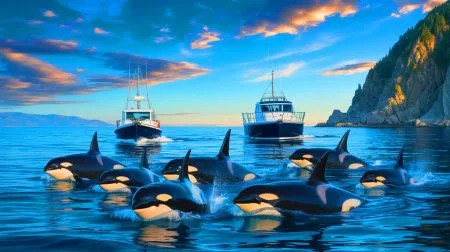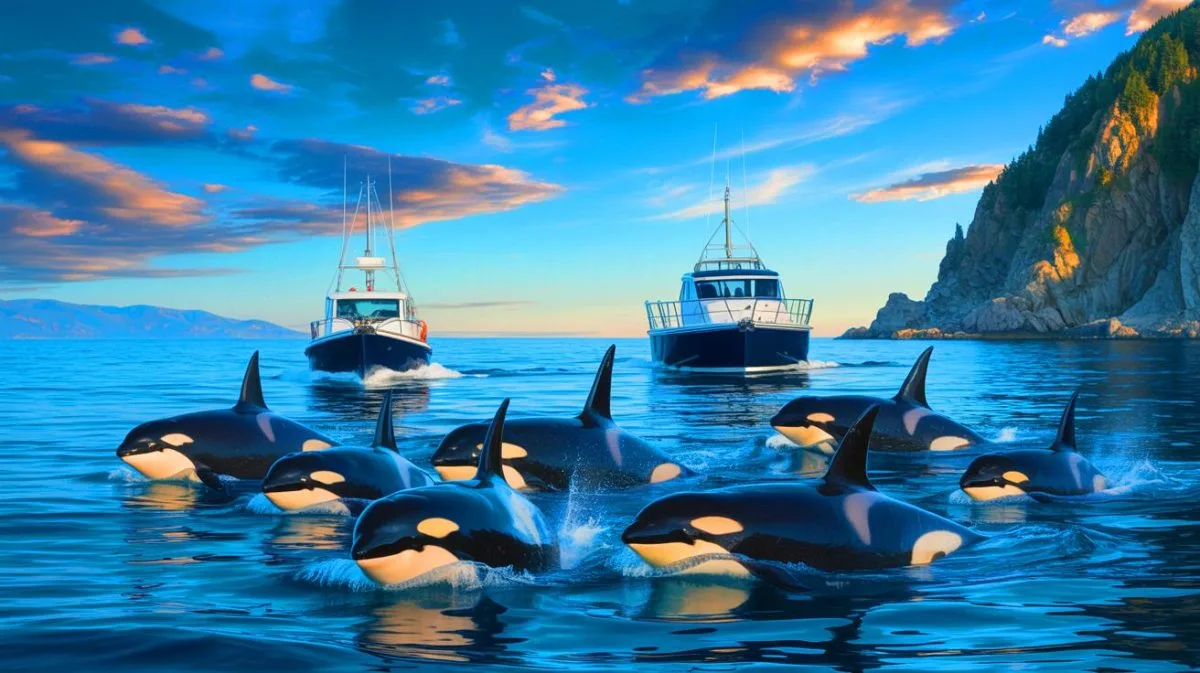| IN A NUTSHELL |
|
In a rare and alarming event off the coast of Portugal, a group of orcas attacked two boats, leading to the sinking of one and significant damage to another. The incidents, which took place off the bay of Cascais and near Fonte da Telha, have sparked discussions among maritime authorities and local communities about the increasing occurrences of such encounters. Fortunately, all nine individuals involved were rescued without injury, thanks to timely interventions by nearby boats and emergency services. These events highlight the unpredictable nature of marine life interactions and raise questions about the reasons behind such aggressive behavior by orcas.
Orca Attacks: A Growing Concern
Saturday’s incidents have added to a growing list of orca encounters that have concerned maritime authorities. The first incident occurred in the early afternoon when a pleasure boat near Cascais was struck by orcas. The impact was forceful enough to sink the vessel, which was carrying four passengers at the time. They were able to capture the dramatic scene on video, which was later shared by the Portuguese media outlet Correio da Manhã. The passengers were rescued by another tourist boat, with no injuries reported, according to the Portuguese National Maritime Authority.
The second incident happened later in the day as another sailboat, carrying five passengers, was struck by orcas near Fonte da Telha. This vessel sustained damage to its rudder and began drifting. While it did not sink, it required towing to the port of Oeiras. Rescue services ensured the safety of all individuals involved, and none required medical attention. These encounters are not uncommon along the Iberian Peninsula’s western coast, where orca interactions have been increasingly reported.
Understanding Orca Behavior
Orcas, also known as killer whales, are highly intelligent marine mammals. They are often perceived as predators at the top of the marine food chain. However, recent incidents of aggressive behavior towards boats have puzzled researchers and maritime authorities. The reasons behind these attacks are not entirely understood. Some experts suggest that they could be playful behavior gone awry, territorial actions, or responses to perceived threats. The lack of a clear understanding of these interactions poses challenges for both sailors and marine biologists.
Research is ongoing to comprehend orca behavior better and to identify patterns that may predict future incidents. Authorities have advised sailors in the region to remain vigilant and to report any unusual sightings. Understanding these behaviors is crucial for developing strategies to prevent future encounters and to ensure the safety of both humans and orcas.
Impact on Local Communities and Tourism
The recent attacks have raised concerns among local communities and businesses, particularly those relying on maritime tourism. The region around Cascais and Fonte da Telha is a popular destination for sailing and boating enthusiasts. The possibility of orca encounters could deter tourists, impacting local economies. Business owners are urging authorities to provide more information and guidance on how to safely navigate waters where orcas are known to frequent.
In response, maritime authorities are considering measures to enhance safety and communication. These may include issuing guidelines for boaters on how to respond if they encounter orcas and increasing patrols in areas where incidents have occurred. The goal is to ensure that the region remains a safe and attractive destination for tourists while respecting the natural habitats of marine wildlife.
Future Implications and Conservation Efforts
These incidents highlight the complex relationship between human activities and marine ecosystems. As human presence in marine environments increases, the likelihood of interactions with wildlife will also rise. These interactions can have significant implications for conservation efforts. Understanding orca behavior is not only essential for ensuring human safety but also for the conservation of these magnificent creatures.
Conservationists emphasize the importance of protecting marine habitats while also finding ways to coexist peacefully with marine wildlife. This includes promoting responsible boating practices and supporting research initiatives aimed at studying marine life behaviors. As marine ecosystems face numerous threats, from climate change to pollution, fostering coexistence is more important than ever.
The recent incidents off the coast of Portugal serve as a reminder of the delicate balance between human activity and wildlife. As we continue to explore and enjoy the oceans, how can we better prepare for and mitigate the risks associated with marine wildlife interactions?
Did you like it? 4.3/5 (22)








Wow, this is like a real-life version of “Jaws” but with orcas! 🐋
Wow, those orcas mean business! Glad everyone got out safely. 🐋
Is this normal behavior for orcas, or is something affecting them?
Why do you think orcas are suddenly becoming aggressive towards boats?
Maybe the orcas just wanted to play tag? 😆
I’m just glad no one was hurt. Kudos to the rescue teams! 🙏
Could climate change be influencing orca behavior?